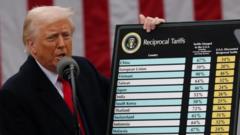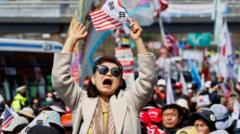As South Korea grapples with the fallout from Yoon Suk Yeol's impeachment, a fringe movement supportive of him has gained momentum, fueled by right-wing YouTubers and growing divisions within society.
A Nation Divided: The Aftermath of Yoon Suk Yeol's Impeachment

A Nation Divided: The Aftermath of Yoon Suk Yeol's Impeachment
South Korea faces deepening political turmoil and polarization following former President Yoon Suk Yeol's controversial impeachment.
Pained cries echoed from the former official residence of President Yoon Suk Yeol on Friday, as crowds gathered following the Constitutional Court's confirmation of his impeachment. Among the throng was 64-year-old Won Bog-sil, who expressed his disillusionment, stating, “I came here with hope in my heart, believing we would win ... It's so unfair.” These dramatic scenes, broadcasted live on YouTube, highlighted the stark contrasts dividing South Korea, illustrating a nation polarized by political strife.
Yoon’s earlier declaration of martial law last December had alienated much of the populace, yet his supporters have rallied around the belief that he has been unjustly treated. This faction has amplified narratives fueled by influential right-wing YouTubers, who argue that martial law was essential in the face of threats posed by pro-North Korea opposition lawmakers and that Yoon's conservative party fell victim to widespread electoral fraud.
The resultant fringe movement, emboldened and increasingly radical, has transitioned from online activism to real-world rallies, often marked by unsettling violence. Signs proclaiming "Stop the Steal" have emerged at pro-Yoon protests, mirroring tactics from the U.S. conservative playbook. Following Yoon's arrest in January, instances of severe altercations surfaced, including a courthouse storming by irate supporters wielding metal beams.
In the wake of these tensions, one elderly man tragically set himself ablaze near Seoul City Hall, leaving behind pamphlets accusing opposition leaders of being aligned with pro-North Korean agendas. The flier declared ominously, “If they remain here, our country will become a communist nation.” Echoes of concern regarding escalating violence and division have reverberated even within conservative circles, leading to unusual criticism of Yoon's supporters.
Initially welcoming YouTubers to his inauguration, Yoon’s administration has reaped unintended consequences. In public statements, he encouraged his followers to turn away from traditional media and embrace "well-organized" YouTube channels. This has allowed opposition narratives to flourish, depicting Yoon as the target of Chinese manipulation in a recent electoral upset.
Supporters, prominent among them young men advocating for an aggressive conservative agenda, have rallied around figures from channels like Young Perspective and various evangelical leaders. Despite significant setbacks in legitimacy, Yoon’s party, the PPP, appears to have gained traction, with approval ratings rebounding back to over 40%, benefiting from shared disdain towards the opposition.
As some members of the PPP back Yoon’s impeachment, others openly criticize the fervent idolization of the controversial figure. This schism breeds confusion even within the party ranks. Observers note a troubling trajectory where both right and left ideologies are fueled by extremist rhetoric, deepening societal rifts.
Political expert Christopher Jumin Lee warns that the polarization churned during Yoon's tenure may render consensus impossible, suggesting that any collaboration with a party that upholds Yoon may be undesirable. He asserts that the current political landscape, shaped by Yoon’s actions, threatens to cement a decade-long division within South Korean society. This turbulent chapter raises pressing questions about the nation’s political future and cohesion.

















